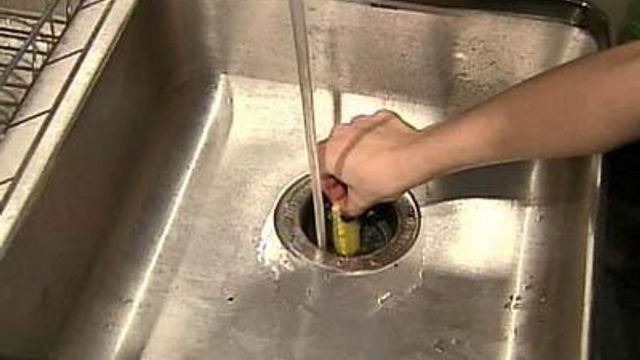Disposal Ban Not Sent Down Drain
Despite opposition from many residents and developers and at least one City Council member, Raleigh's new ban on garbage disposals remained in place Tuesday.
Posted — UpdatedThe disposal ban, which the City Council approved two weeks ago, is among the first in the country. Although city officials previously said violators face fines of up to $25,000 a day, they said Tuesday that most homeowners would receive warning notices.
Repeat offenders could face hefty fines or the cost of cleaning up sewer overflows, officials said.
City officials said putting food and grease through a disposal and into the municipal sewer system clogs the lines and frequently causes back-ups and overflows. The state Division of Water Quality fined the city nearly $4,000 in December for major sewer spills.
Local officials also said using disposals wastes about 500,000 gallons of water a day throughout the municipal water system.
Under the ban, homeowners can continue to use existing disposals, but no new devices can be installed and existing ones can't be replaced when they quit working. The ban also applied to Wake County customers on septic systems, but officials said homes that have obtained city permits and are already under construction will be allowed to keep their disposals.
Councilman Philip Isley, who missed the March 4 vote on the issue, on Tuesday tried to get the city to delay enforcement of the ban for a month or two so the council's Public Works Committee could study the ban's impact.
"Complete strangers are stopping me in the store and asking, 'What are you thinking?'" Isley said, noting the public might view the issue as a barometer of the council's regulatory leanings. "This debate may seem inane – the whole thing may be trivial to you – but it's not trivial to me."
The president of a major garbage disposal company also flew in from Wisconsin to convince the City Council to back off the ban.
"There are 60 million households regularly using these throughout the United States," said Jerry Ryder, president of InSinkErator.
Isley's effort failed, but it did produce one effort to ease the tension at the council meeting when Councilman Thomas Crowder gave him a composting pot in which to dispose of his food scraps.
Instead, the council's Budget and Economic Development Committee will review the disposal ordinance and recommend any adjustments to the full council.
Environmental groups applauded the move.
"I think people need to understand that (without the disposal ban) raw sewage will end up on public greenways, near rivers and streams," said Dean Naujoks, of the Neuse River Foundation.
• Credits
Copyright 2024 by Capitol Broadcasting Company. All rights reserved. This material may not be published, broadcast, rewritten or redistributed.






